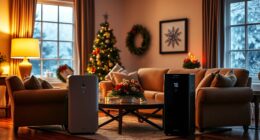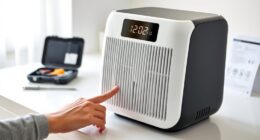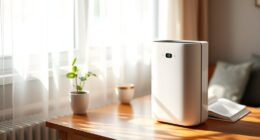To improve your respiratory health, keep your indoor air clean by regularly dusting, vacuuming with a HEPA filter, and using an air purifier. Minimize indoor pollutants by choosing fragrance-free products and ensuring good ventilation. During outdoor pollen seasons, stay indoors during peak times, wear sunglasses outdoors, and shower afterward to remove allergens. Small adjustments can make a big difference—continue exploring ways to breathe easier and protect your lungs.
Key Takeaways
- Use HEPA air purifiers and maintain clean filters to reduce airborne allergens indoors.
- Keep windows closed during high pollen seasons and rely on air conditioning with clean filters.
- Regularly clean and dust living spaces to minimize indoor pollutants and irritants.
- Limit outdoor activities during peak pollen times and wear protective eyewear when outside.
- Ensure good ventilation and avoid indoor smoking to improve overall air quality for respiratory health.

Clean air is essential for everyone, but it’s especially critical for seniors whose health can be more vulnerable to pollution. As you age, your respiratory system becomes more sensitive, making it imperative to understand the sources of indoor pollution and outdoor allergens that can compromise your breathing. Indoor pollution, often overlooked, can come from everyday household items like cleaning supplies, furniture, and even indoor plants. These sources release chemicals and particulate matter that can irritate your lungs and worsen respiratory conditions. Keeping your living space well-ventilated is key; open windows when possible, and use exhaust fans to reduce the buildup of indoor pollutants. Choose natural or fragrance-free cleaning products, and avoid smoking indoors, as secondhand smoke greatly contributes to indoor pollution. Regularly dust and vacuum with a HEPA filter to trap dust mites, pet dander, and other allergens that may settle in carpets and upholstery. Maintaining a clean, dust-free environment minimizes the risk of respiratory irritation caused by indoor toxins. Understanding indoor pollution sources can help you better manage your living environment and reduce health risks.
Outdoor allergens also pose a substantial threat to your respiratory health, especially during high pollen seasons. Pollen from trees, grasses, and weeds can trigger allergic reactions or exacerbate asthma symptoms. To protect yourself, check daily pollen forecasts and stay indoors during peak times, typically in the early morning or windy days. When you do go outside, wear sunglasses and a wide-brimmed hat to prevent pollen from reaching your eyes and face. Shower and change clothes after outdoor activities to remove any pollen that may cling to your skin or clothing. Keep windows closed and use air conditioning with a clean filter to prevent outdoor allergens from entering your home. If you have allergies or asthma, consider investing in an air purifier with a HEPA filter for your living space. It can greatly reduce airborne allergens and improve indoor air quality.
Staying mindful of both indoor pollution and outdoor allergens can greatly improve your respiratory health. Regular cleaning, vigilant outdoor activity management, and the use of air filtration devices help create a safer environment for your lungs. Remember, your environment plays a key role in your overall well-being. By taking these simple steps, you can breathe easier, reduce allergy symptoms, and enjoy a higher quality of life. Protecting yourself from pollutants is a proactive way to support your health, especially as your body becomes more susceptible to the effects of poor air quality. Making small adjustments in your daily routine can make a big difference in ensuring that the air you breathe is as clean and healthy as possible.
Frequently Asked Questions
How Can Seniors Reduce Indoor Air Pollution Effectively?
You can reduce indoor air pollution by adding air filtration systems like HEPA filters, which trap pollutants and allergens. Incorporate indoor plants such as spider plants or peace lilies, as they naturally purify the air. Keep your home well-ventilated by opening windows regularly, and avoid smoking indoors. Regularly clean surfaces and replace filters to maintain good air quality, helping seniors breathe easier and stay healthier.
Are There Specific Air Purifiers Recommended for Elderly Homes?
They say, “Prevention is better than cure,” so choosing the right air purifier is essential. For seniors, portable purifiers with HEPA filters are highly recommended because they effectively trap airborne particles. Look for models designed for larger spaces or with quiet operation. Investing in a trusted brand guarantees cleaner indoor air, helping your loved ones breathe easier and stay healthier at home.
How Does Humidity Affect Seniors’ Respiratory Health?
Humidity control is essential for your respiratory health. When moisture levels are too high, it can encourage mold and dust mites, worsening breathing issues. Too low, and your airways can dry out, causing irritation and discomfort. You should aim for balanced humidity levels, around 40-50%. Using a humidifier or dehumidifier helps maintain this balance, ensuring your air is comfortable and healthier for your lungs.
Can Outdoor Air Quality Impact Seniors With Respiratory Issues?
Think of outdoor air quality as a shield that can either protect or expose you. Yes, outdoor pollution can worsen your respiratory issues, making it harder to breathe and heal. Staying aware of air quality levels is crucial—use air quality awareness apps or alerts to plan outdoor activities wisely. By avoiding high pollution days, you safeguard your lungs and maintain better respiratory health, even when nature’s calling.
What Lifestyle Changes Benefit Seniors’ Respiratory Health Long-Term?
You can improve your respiratory health long-term by establishing regular exercise routines that strengthen your lungs and boost immunity. Incorporate dietary adjustments, like eating antioxidant-rich foods and staying hydrated, to reduce inflammation. Avoid smoking and polluted environments whenever possible. Consistently practicing these habits helps maintain clearer airways, enhances lung capacity, and supports overall respiratory wellness, making it easier to breathe comfortably as you age.
Conclusion
Now that you know the importance of clean air, imagine the difference it could make for your breathing and overall health. But there’s more to discover—hidden dangers lurking in everyday environments that could surprise you. Are you truly protected? Stay vigilant and keep these tips in mind. Your next breath could be the key to a healthier, more vibrant life. Don’t wait—the air you breathe might hold the secret to your well-being.









